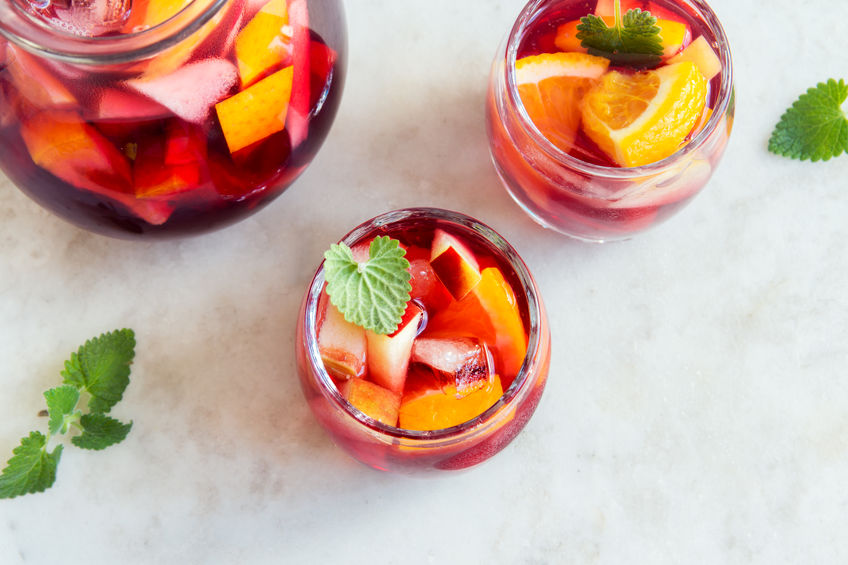Hey all you wine lovers, this one’s for you.
I read food logs and talk with busy professionals for a living. It’s usually not to far into the conversation that the topic of wine comes up. My clients want to know do I have to give up wine to be healthy? To lose weight? Is it ok to enjoy a glass after dinner in the evenings?
Wine is a sensitive subject (just like coffee and chocolate) because it’s a beloved beverage for many people. So if you’re used to loving a glass of red in the evening, or on a patio lunch, you’re going to want to read this post.
There’s a lot of hype and health claims floating around the internet. You can pretty much find an article to back up eating any of your favourite foods. So when it comes to red wine, I wanted to give you the real research on exactly what the health benefits of wine are, and whether or not you need wine in your diet to be healthy.
If you’ve heard that red wine is one of the healthiest of all alcoholic beverages, it’s for good reason.
Thanks to the antioxidants found in the skins of grapes from which it’s made, red wine has been widely publicized as being “healthful.” The kind of antioxidants found in red wine, like RESVERATROL, have powerful anti-inflammatory properties.
Inflammation and oxidation are considered the root causes of most disease, so consuming antioxidant-rich foods is a key component in disease prevention.
Moderate consumption of red wine has been linked to improved heart health, along with other health benefits, like decreasing the risk of:
- Alzheimer’s disease
- diabetes
- certain cancers
- depression
Some of the buzz around red wine’s health benefits comes from its prominent role in the well-studied Mediterranean diet.
The Mediterranean diet includes lots of fruit, vegetables, fish, olive oil, and red wine, and is believed to contribute to a long lifespan and low incidences of heart disease and cancer among Mediterranean populations.
The health benefits of red wine are also thought to contribute to low rates of heart disease among the French, despite this population traditionally eating a diet high in saturated fat (think cheese, cream, and buttery croissants!).
How exactly does red wine improve heart health?
But, does a glass of red wine a day really keep the doctor away? Maybe.
Studies have linked regular consumption of red wine with the following positive outcomes:
- Increased HDL cholesterol (the good, protective kind)
- Lowered LDL cholesterol (the bad, inflammatory kind)
- Lowered triglycerides (fat or lipids found in the blood)
- Improved blood pressure
- More stable blood sugar levels
High blood pressure, elevated blood sugar, and undesirable cholesterol and triglyceride levels are all contributing factors in the development of more serious heart disease, like heart attacks and stroke.
Is red wine an essential part of a healthy diet?
The short answer is no.
In fact, a large number of health-seekers are choosing to eliminate alcohol from their diets altogether. Large cities like LA, New York and Toronto are seeing sober night clubs and lounges popping up, and restaurants starting to offer alcohol-free spirits.
So if you aren’t a fan of wine or choose not to drink alcohol, there’s no reason to start drinking red wine for the sake of your health! Plenty of other diet and lifestyle factors, like eating lots of vegetables and fruit, getting regular physical activity, not smoking, and managing stress can provide the same health benefits.
But if you’re not looking to give up your glass of wine, you should know that red varieties have added antioxidants and health benefits, so may be a more health-conscious choice than white. While white wine does contain some antioxidants from grapes, red wine contains much higher amounts.
Like any other alcoholic beverage, it’s also important to remember to limit wine consumption. The health benefits of red wine only apply when it is enjoyed in moderation. Surprise!
I had a great conversation with Angela Aiello aka Super Wine Girl about how wine fits into busy professionals’ lifestyles. We talked about conscious drinking, when to choose wine and when to avoid it. Angela also shared some great tips with us about the amount of sugar vs alcohol in a wine. Watch it here.
When consumed in excess, any alcoholic beverage can negatively impact your health, contributing to alcohol dependence, organ damage, and increased risk of several cancers.
A good rule of thumb for alcohol intake is to limit consumption to one (1) drink per day for women and one to two (1-2) drinks per day for men. The serving size for one standard glass of red wine is 4 oz.
Since the size of wine glasses can vary, use a liquid measuring cup to familiarize yourself with what a 4 oz pour of wine looks like. Then, stick to that serving size!
References
Healthline – https://www.healthline.com/nutrition/red-wine-good-or-bad
Healthline – https://www.healthline.com/nutrition/red-vs-white-wine
Time.com – http://time.com/4070762/red-wine-resveratrol-diabetes/
Recipe:
Skinny Sangria Spritzer
Makes 6 servings

Ingredients:
- 1 bottle dry red wine (use your favourite but consider seeking out an organic variety = no sulphites or other congeners/additives)
- 1 ½ cups soda water (you can use a fruit flavoured variety, if desired – but no sugar added)
- 2 cups assorted fresh fruit, such as sliced strawberries, blackberries, orange slices, chopped apples, pears, or plums (have fun mix and matching your favourites!)
- Ice cubes
How to prepare:
- Place prepared fruit in bottom of a large pitcher and lightly muddle with a wooden spoon.
- Pour wine and soda water into pitcher and stir to combine.
- Add 1 cup of ice to pitcher and stir to chill.
- To serve, pour Skinny Sangria over ice-filled glasses. Be sure each glass gets a spoonful of fruit!


